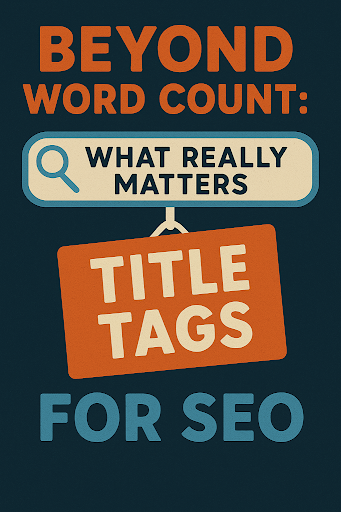SEO friendly title tags seem simple at first. Just write a short headline for your page and toss in a keyword, right? Not quite. If you’ve been working on SEO recently, you probably already know that Google plays by its own rules, and those rules are changing.
The big headline now isn’t about pixel limits or strict character counts. It’s that title tags are evolving into something less about limits and more about usefulness. The old rules haven’t totally disappeared, but they matter less than how well your title reflects what’s actually on the page.
Why Everyone Still Talks About Title Tags
Even with Google rewriting a lot of them (over 60% according to Search Engine Land), title tags still carry weight. Think of them as your site’s first impression. They show up in search results, browser tabs, and social previews. They set expectations.
When done well, a title tag helps your page get clicked. It gives people a reason to pick your link over someone else’s. And if it doesn’t connect with what a user is looking for—or worse, if it misleads, it’ll just push them away.
It’s Not Just About Character Count
There’s a long-standing myth in SEO that title tags must stay under 60 characters to be “good.” But in practice, what matters more is how your title reads and whether it lines up with the content underneath.
Here’s what matters more than squeezing your words into a tight space:
- Clarity is king
If your title doesn’t clearly describe the page, you’re losing people before they even click. - Keyword placement matters—but only if it’s natural
Start strong with your main idea. Don’t bury the topic halfway through, and don’t sound like a robot trying to tick SEO boxes. - Make people care
Adding a little emotion, curiosity, or even just directness can go a long way. You’re writing for humans first, algorithms second. - Put the most important words early
Mobile screens will cut you off if you ramble. Get to the point early and avoid stacking your brand name at the front every time unless that’s what sells the click.
Small Shifts That Make a Big Difference
When looking at title tag performance, it’s easy to assume you need a huge overhaul. But a few small tweaks can go a long way:
- Swap generic words for something more specific
- Move key terms closer to the front
- Avoid filler phrases that don’t add anything (“Welcome to,” “Learn more about”)
- If you include your brand name, place it at the end unless it truly carries weight for searchers
Also, remember that Google can rewrite your title tag based on the query. It might pull from H1s, anchor text, or other parts of the page. That’s not a bad thing—but it does mean your content needs to be consistent all the way through.
Common Mistakes That Still Happen with SEO friendly title tags
A lot of businesses either forget about their title tags or overthink them. Somewhere in the middle is usually the sweet spot.
Here are some pitfalls to avoid:
- Too vague
“Home” or “Services” tells the user nothing. Add context. - Too stuffed
“Plumber Plumbing Pipe Repair Water Heater Drain Cleaning” might cover keywords, but it reads terribly. People won’t click—and Google knows that. - Too repetitive across the site
Don’t copy the same formula to every page. Give each one its own identity. - Too flashy
Clickbait titles might work for news, but in business search, people want trust and clarity. Not drama.
Bringing It All Together
So, what should your SEO friendly title tags do?
They should reflect the content, be written for humans, and show up well across screens. Forget the perfect word count. Focus on clarity, tone, and intention. That’s what really gets results today.
If your current titles still sound like something out of 2012 SEO playbooks, now’s a good time to clean them up.
And if you’re looking to get more serious about how your brand shows up in search, you can always optimize your online visibility with an expert SEO strategy that’s built for today—not yesterday’s algorithm.



